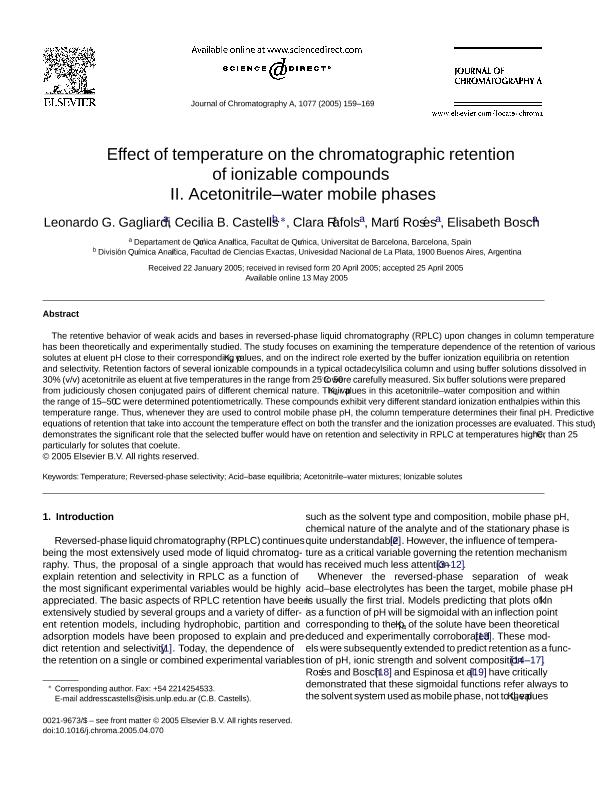Mostrar el registro sencillo del ítem
dc.contributor.author
Gagliardi, Leonardo Gabriel

dc.contributor.author
Castells, Cecilia Beatriz Marta

dc.contributor.author
Ràfols, Clara
dc.contributor.author
Rosés, Martí
dc.contributor.author
Bosch, Elisabeth
dc.date.available
2020-01-21T20:06:13Z
dc.date.issued
2005-06
dc.identifier.citation
Gagliardi, Leonardo Gabriel; Castells, Cecilia Beatriz Marta; Ràfols, Clara; Rosés, Martí; Bosch, Elisabeth; Effect of temperature on the chromatographic retention of ionizable compounds: II. Acetonitrile–water mobile phases; Elsevier Science; Journal of Chromatography - A; 1077; 2; 6-2005; 159-169
dc.identifier.issn
0021-9673
dc.identifier.uri
http://hdl.handle.net/11336/95453
dc.description.abstract
The retentive behavior of weak acids and bases in reversed-phase liquid chromatography (RPLC) upon changes in column temperature has been theoretically and experimentally studied. The study focuses on examining the temperature dependence of the retention of various solutes at eluent pH close to their corresponding pKa values, and on the indirect role exerted by the buffer ionization equilibria on retention and selectivity. Retention factors of several ionizable compounds in a typical octadecylsilica column and using buffer solutions dissolved in 30% (v/v) acetonitrile as eluent at five temperatures in the range from 25 to 50 °C were carefully measured. Six buffer solutions were prepared from judiciously chosen conjugated pairs of different chemical nature. Their pKa values in this acetonitrile–water composition and within the range of 15–50 °C were determined potentiometrically. These compounds exhibit very different standard ionization enthalpies within this temperature range. Thus, whenever they are used to control mobile phase pH, the column temperature determines their final pH. Predictive equations of retention that take into account the temperature effect on both the transfer and the ionization processes are evaluated. This study demonstrates the significant role that the selected buffer would have on retention and selectivity in RPLC at temperatures higher than 25 °C, particularly for solutes that coelute.
dc.format
application/pdf
dc.language.iso
eng
dc.publisher
Elsevier Science

dc.rights
info:eu-repo/semantics/openAccess
dc.rights.uri
https://creativecommons.org/licenses/by-nc-sa/2.5/ar/
dc.subject
ACETONITRILE-WATER MIXTURES
dc.subject
ACID-BASE EQUILIBRIA
dc.subject
IONIZABLE SOLUTES
dc.subject
REVERSED-PHASE SELECTIVITY
dc.subject
TEMPERATURE
dc.subject.classification
Química Analítica

dc.subject.classification
Ciencias Químicas

dc.subject.classification
CIENCIAS NATURALES Y EXACTAS

dc.title
Effect of temperature on the chromatographic retention of ionizable compounds: II. Acetonitrile–water mobile phases
dc.type
info:eu-repo/semantics/article
dc.type
info:ar-repo/semantics/artículo
dc.type
info:eu-repo/semantics/publishedVersion
dc.date.updated
2020-01-21T18:44:56Z
dc.journal.volume
1077
dc.journal.number
2
dc.journal.pagination
159-169
dc.journal.pais
Países Bajos

dc.journal.ciudad
Amsterdam
dc.description.fil
Fil: Gagliardi, Leonardo Gabriel. Universidad de Barcelona; España. Consejo Nacional de Investigaciones Científicas y Técnicas; Argentina
dc.description.fil
Fil: Castells, Cecilia Beatriz Marta. Universidad Nacional de La Plata. Facultad de Ciencias Exactas; Argentina. Consejo Nacional de Investigaciones Científicas y Técnicas; Argentina
dc.description.fil
Fil: Ràfols, Clara. Universidad de Barcelona; España
dc.description.fil
Fil: Rosés, Martí. Universidad de Barcelona; España
dc.description.fil
Fil: Bosch, Elisabeth. Universidad de Barcelona; España
dc.journal.title
Journal of Chromatography - A

dc.relation.alternativeid
info:eu-repo/semantics/altIdentifier/url/https://www.sciencedirect.com/science/article/pii/S0021967305008605
dc.relation.alternativeid
info:eu-repo/semantics/altIdentifier/doi/http://dx.doi.org/10.1016/j.chroma.2005.04.070
Archivos asociados
